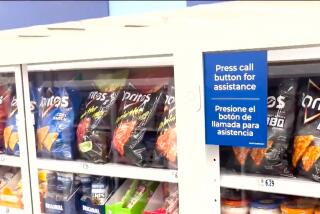Their Lives With Fear in Store
Mirna Regollar worked at Junior’s Market in Santa Paula with her husband, Eligio. My mother worked at Alex’s Grocery in downtown Los Angeles with my father.
At night, Mirna attended school to study nursing. At night, my mother studied pharmacy. Regollar had two children--just like my mother.
It’s the Regollars’ children, though, who are living out my worst nightmare.
Reading the stories earlier this week about how Mirna, just 25, had been shot dead while working behind the counter of her store, I felt a lump in my throat.
Police figure it was most likely a robbery--a crime I came to know all too well.
Her death reminded me of my childhood. My sister and I used to peer out the window at night for the sight of the sky-blue station wagon, the car that would let us know my parents had safely arrived home from the store.
When they didn’t pull up to the curb by 8 p.m., we fretted like worried parents. Had they been punched at the store? Smacked with a pistol? Stabbed while locking up? Shot while walking to the parking lot?
None of these possibilities seemed farfetched.
Every few years, my parents attended the funeral of a friend or church member who had been shot dead working at a grocery store. They also read the local Korean papers and learned frequently about the violent deaths of other Korean store owners.
During his store’s grand opening, my dad’s friend once gave my sister and me some Dr. Pepper. A few years later, he was shot dead during a robbery at his store. My parents went to his funeral.
By the time I was 15, I had a chance to see first-hand how unsafe and difficult my parents’ jobs were.
I worked with my parents on weekends and summer vacations: Up by 5 a.m., out the door of our Glendale home by 5:30 a.m. Off to the warehouse in downtown L.A. to buy bunches of bananas, boxes of Vienna sausages, packs of Juicy Fruit gum, six-packs of Budweiser, cartons of Pall Malls.
By 7 a.m., I pulled aside the sliding metal security shutter, yanked the strings on the Coors and Budweiser lights and began my shift behind the counter.
At midday, we took turns in the storage room napping atop milk cartons covered with flattened cardboard boxes. I tried to avoid deep sleep so I could help in case there was trouble.
I have been robbed a few times myself: $20 bills snatched from the counter, the register rifled while I tried to find shampoo for another customer.
Once my mother ran after someone who snatched a bottle of Irish Rose wine. She ordered me to stay at the door because the store would be left empty otherwise.
Just 5 feet tall, my mother ran half a block to confront the thief, who towered over her. He happened to be a cross-dresser in full regalia, including long, sharp, phony nails.
I saw him punch her in the face and run off. The crowd on East 7th Street was so accustomed to crime, they merely watched.
She cried in pain. Her split nose bled. She walked back empty-handed.
Some may think it was silly of my mom to put herself in such danger for a $2 bottle of wine. Probably so.
Yet, a loss like that is painful when you are selling 25-cent potato chips with a 5-cent profit margin. A lost $2 means there was no point in standing all day and selling 40 bags of chips.
Even worse, a theft in the store is an insult no matter how small the amount, like having a guest steal from you in your own house.
On the way home, I wished I knew how to drive so my mother didn’t have to steer with one hand clamped over her nose, crying in pain, frustration, sadness and anger.
Another time, I sat in court and stared for the longest time at the young man who sat before the judge. I was expecting to see someone cruel and hateful. The man appeared only empty, hopeless.
I wondered what he was thinking when he held the gun to the part-time worker’s face and commanded my father to stand against the refrigerator. I wondered what he wanted to do with the $600 he stole. I imagined what would have happened if he had pulled the trigger.
After a hearing that lasted all of 15 minutes in a room packed with others waiting their turn, the judge handed down a jail sentence and the man was led away. So routine. So cyclical.
I feel grateful my parents have always come back home each time. I feel grateful that I--now two years older than Mirna--have always managed to stay unharmed. I feel grateful my younger sister is still safe too.
After taking those night classes, my mom regained the pharmacy license she had when she was in Korea. Now she works at a Hollywood pharmacy which is far safer than the grocery my father still runs.
I wish Mirna had had the chance to continue her studies. I wish her 4-year-old daughter, Jackie, and 8-year-old son, Jeffrey, could peer through the window and see their mother coming home at night. I can’t fully understand but can only imagine how Mirna’s husband Eligio is feeling.
When I go home on the weekends, sometimes I still wait by the window--no longer for the sky-blue station wagon but for the Dodge van that will carry my father home.
More to Read
Sign up for Essential California
The most important California stories and recommendations in your inbox every morning.
You may occasionally receive promotional content from the Los Angeles Times.










